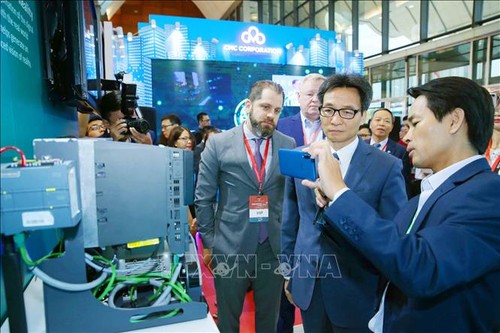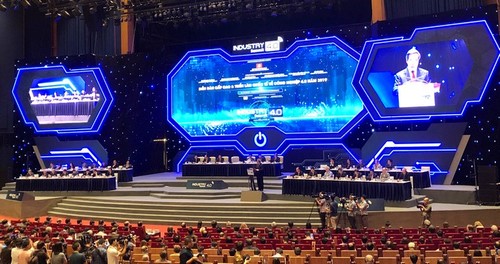 Deputy Prime Minister Vu Duc Dam (C) visits the Industry 4.0 exhibition at the National Convention Centre in Hanoi. (Photo: Phuong Hoa/VNA) Deputy Prime Minister Vu Duc Dam (C) visits the Industry 4.0 exhibition at the National Convention Centre in Hanoi. (Photo: Phuong Hoa/VNA) |
Vietnam sees industrialization as essential to a market economy, international integration, making the most of the Fourth Industrial Revolution, and sustainable, inclusive development. Industrialization requires well-developed science, technology, and human resources.
Deputy Prime Minister Vu Duc Dam said: “We need to acknowledge science as a national policy, a driving force, and the key to escaping the middle-income trap and growing rapidly and sustainably.”
Mr. Dam called for better science and technology mechanisms and policies so that Vietnam can improve its development indexes and catch up with Industry 4.0.
He said businesses should be at the center of innovation and creativity, should invest more in science and technology, and should establish more private research institutes.
Nguyen Van Vinh, Deputy Director of the Vietnam Institute for Development Strategies (VIDS), said globalization, integration, the Internet of Things, artificial intelligence, and new materials are requiring Vietnam to change its mindset about industrialization.
“The government should develop a platform for sharing big data, the Internet of Things, and technological achievements. Industrialization will shift society toward a modern digital economy based on technological advances,” said Vinh.
 The Industry 4.0 Summit (Photo: dangcongsan.vn) The Industry 4.0 Summit (Photo: dangcongsan.vn) |
According to Vinh, innovation needs to be channeled into specific action programs, strategies, and legal frameworks that connect Vietnam’s producers with international production chains.
Do Khoa Van, Director of Ha Tinh province’s Department of Science and Technology, underlined the importance of changing the mindset of local leaders to accept science and technology as a national priority.
Van said: “Leaders of agencies, businesses, localities, and research institutes must change their mindset in order to meet the demands of the Fourth Industrial Revolution.”
The Politburo’s resolution on national industrial development orientation till 2030 with a vision to 2045 sets a goal of making Vietnam one of the top three industrialization countries in ASEAN, with some of its industries globally competitive and integrated with the global value chain. The vision to 2045 sees Vietnam as a modern, industrialized country.